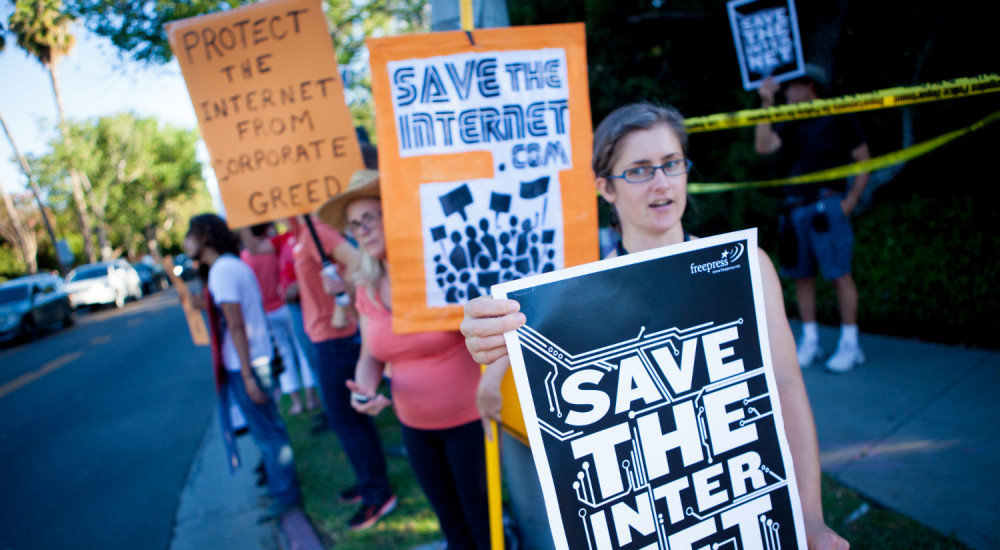Cyber-Socialism
“…adopting a solution that won’t work to a problem that doesn’t exist using legal authority we don’t have,” leading to “billions of dollars in new taxes.”
Sound familiar? Those words from FCC Commissioner Ajit Pai bring home the reality of a recent decision that has been largely buried under the latest Hillary scandal, the GOP’s little heads-up letter to the Ayatollah and the foreign policy crises surrounding ISIS and Iran. But it is a decision that will insidiously affect every single American.
Innocently couched in the term “net neutrality,” the FCC decision to “level the playing field” on internet service threatens to do what socialism always does – improve the lot of the few at the expense of the many, impede the free market and grant the federal government broad new powers.
Of course, we are assured that, new regulations aside, if you like your internet, you can keep your internet. And that is about as true as when it was originally said about your health insurance policy in the wake of “we have to pass it so you can find out what’s in it”.
In what can only be fairly described as a breathtaking power grab, the FCC has given us Obamanet. So now is the time to wax nostalgic about the heady early days of the internet and the free market pioneers who turned it into an indispensable vehicle for the entire world. Because Barack Obama has tried to make certain those days are gone forever.
Indeed, one of the things that made the astounding scope of the internet possible is that it was left free from government meddling for so much of its young life. If you try, in many (most) places in these United States to start a new business, you face innumerable hurdles of regulation and government interference. How many government offices do you think you have to visit, call, write, petition and pay to, say, start a restaurant? Does that obstacle course make for greater or fewer choices for the dining public? We know the answer is fewer. But starting a website or web-based business has until now been free from many of these hassles, and as such, activity has soared. This benefits both seller and buyer, making both richer, and that’s why it’s a no-brainer that such exchanges should be encouraged rather than discouraged, protected rather than hobbled.
So what did the FCC do? I mean, you haven’t gotten a notice from the new federal internet police when visiting your favorite website. You can still buy your books and most everything else from Amazon, and your music from Apple, so where’s the trouble? Well, the FCC, in a straight party line decision, voted 3-2 to incorporate the internet into its content and distribution regulation web. Under the new rules, the “FCC officials would … no longer classify the Internet as an “information service” but a “telecommunications service” subject to Title II of the 1934 Communications Act.”
That may not seem like such a big deal…until you find out what it allows them to do. This reclassification empowers the FCC to govern the internet and internet companies as they would a utility company. As per the dissenting FCC Commissioner Pai’s statement on the new rule, “[i]t seizes unilateral authority to regulate Internet conduct, to direct where Internet service providers (ISPs) make their investments, and to determine what service plans will be available to the American public. This is…a radical departure from the bipartisan, market oriented policies that have served us so well for the last two decades. “
The reason for such a radical change in policy is simply stated by Commissioner Pai – “We are flip-flopping for one reason and one reason alone. President Obama told us to do so. On November 10, President Obama asked the FCC to implement his plan for regulating the Internet, one that favors government regulation over marketplace competition. As has been widely reported in the press, the FCC has been scrambling ever since to figure out a way to do just that.”
Hard and fast rules are effective if you want a simple system of laws and rules to follow. If, however, you want to exploit the rules for your own gain, to limit competition, and to help your friends and punish your enemies, then you need more rules and regulations – the more the better, and the more nebulous the better.
The Wall St. Journal’s Gordon Crovitz has done a great job discussing how these rules will be used to limit competition, harming consumers in favor of companies who can exploit the rules in their favor:
Competitors could have objected to the “fast lane” that Amazon got from Sprint at the launch of the Kindle to ensure speedy e-book downloads. The FCC could have blocked Apple from integrating Internet access into the iPhone. Activists could have objected to AOL bundling access to The Wall Street Journal in its early dial-up service.
Among the first targets of the FCC’s “unjust and unreasonable” test are mobile-phone contracts that offer unlimited video or music. Netflix,the biggest lobbyist for utility regulation, could be regulated for how it uses encryption to deliver its content.
Unlike mere profit-seeking companies, you see, utilities must act in the “public good.” So who gets to determine what is good for the public? The simple answer is that Barack Obama and his friends at the FCC will decide what’s good. This will inevitably lead to tech companies funneling even more campaign cash to the people promoting and enforcing these regulations, revolving door consultancies and the soft corruption of board seats and speaking fees.
The very regulation itself is a double bonus for Obama – in addition to the increase in power, he can provide a simple payoff to large tech companies who support increased regulation to thwart competition. Per the Washington Post, “The affinity between the White House and the tech industry has enriched Obama’s campaigns through donations, and it has presented lucrative opportunities for staffers who leave for the private sector.” That piece goes on to document the veritable panoply of Obama insiders who are now the beneficiaries of sweetheart deals at big tech companies.
This President makes sport of punishing his enemies and rewarding his friends, allies and those who have paid for protection. These current rules will allow him to do more of the same. Then, after he leaves office, the rules can continue in place for the next administration to do the same – the left ignores this political reality at their own peril.
Lest we need say it again, the reason to limit executive power is because we know from centuries of politics that power corrupts and absolute power corrupts absolutely. We can only hope that will bear out via legislative and judicial attempts now underway to restrict these new rules that threaten to turn our vibrant internet into just another victim of a power-hungry government trying to regulate everything that’s not nailed down.



